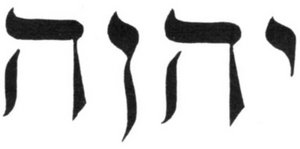On August 10th I posted an article on the Pope's prohibition of the use of tetragrammaton in the sacred Liturgy. You can read the original posting here.
A recent reflection on the restoration of this practice follows.
Why "Yahweh" Isn't Used in Catholic Liturgy
Biblical Expert Says It Reflects Jewish Tradition
JERUSALEM, NOV. 21, 2008 (Zenit.org) - To understand the Vatican directive reiterating that the name of God revealed in the tetragrammaton YHWH is not to be pronounced in Catholic liturgy, it helps to know the history behind the Jewish tradition, says a biblical expert.
Father Michel Remaud, director of the Albert Decourtray Institute, a Christian institute of Jewish studies and Hebrew literature, explained to ZENIT that the message published in June by the Congregation for Divine Worship and the Sacraments reflects current Jewish practice.
The Vatican note explained: "The venerable biblical tradition of sacred Scripture, known as the Old Testament, displays a series of divine appellations, among which is the sacred name of God revealed in a tetragrammaton YHWH -- hwhw.
 "As an expression of the infinite greatness and majesty of God, it was held to be unpronounceable and hence was replaced during the reading of sacred Scripture by means of the use of an alternate name: 'Adonai,' which means 'Lord.'"
"As an expression of the infinite greatness and majesty of God, it was held to be unpronounceable and hence was replaced during the reading of sacred Scripture by means of the use of an alternate name: 'Adonai,' which means 'Lord.'"
Father Remaud said that "until almost the year 200 B.C., the divine name was pronounced every morning in the temple in the priestly blessing: 'The Lord bless and keep you: The Lord make his face to shine upon you, and be gracious to you'" (Numbers 6:24-26).
He said this blessing originated out of the context of the next verse in Numbers: "So shall they put my name upon the people of Israel, and I will bless them."
Left unsaid
Furthermore, the priest said that the Mishna, the Jewish law codified toward the end of the second century, "specifies that the name was pronounced in the temple 'as it is written,' while another denomination (Kinuy) was used in the rest of the country. After a certain period, the divine name was no longer pronounced in the temple's daily liturgy.
"The Talmud leads one to understand that the decision was taken to avoid a magic use of the name by some."
According to Father Remaud's sources, ever "since the death of the high priest Simon the Righteous, about 195 B.C., the divine name was no longer pronounced in the daily liturgy."
The expert compared the Talmud's testimony with the Book of Sirach, which mentions Simon the Righteous in Chapter 50. Chapters 44-50 remember all "godly men" since Enoch, including Abraham, Moses and David.
Father Remaud said the seven-chapter passage ends with the high priest Simon pronouncing the divine name: "Then Simon came down, and lifted up his hands over the whole congregation of the sons of Israel, to pronounce the blessing of the Lord with his mouth, and to glory in his name; and they bowed down in worship a second time, to receive the blessing of the Most High" (Sirach 50:20-21).
 From the time of Simon the Righteous until the temple's ruin, the name was only heard "as it is written" during the Yom Kippur liturgy at the temple of Jerusalem, where the high priest pronounced it 10 times, continued Father Remaud.
From the time of Simon the Righteous until the temple's ruin, the name was only heard "as it is written" during the Yom Kippur liturgy at the temple of Jerusalem, where the high priest pronounced it 10 times, continued Father Remaud.
"On hearing the explicit name from the mouth of the high priest, the 'cohanim' [Aaron's descendants] and the people present in the atrium knelt down, prostrated themselves with their face on the ground saying: 'Blessed be the glorious name of his Kingdom forever.'"
The Mishna does not say that the high priest pronounced the divine name, but that the name "came out of his mouth," he clarified.
A whisper
Moreover, continued Father Remaud, it seems that toward the end of the period of the second temple -- 70 A.D. -- the high priest now only pronounced the word in a whisper. This was explained in a childhood memory of Rabbi Tarphon (1st-2nd centuries), who recalls that even straining to hear, he could not hear the name.
The biblical scholar also noted that the formula of Exodus -- "This is my name forever" (Exodus 3:15) -- through a play of words in Hebrew is interpreted by the Talmud of Jerusalem as "This is my name to remain hidden."
"Today, the divine name is never pronounced," continued Father Remaud. "In the Yom Kippur office of the synagogue, which replaces the temple's liturgy by the recitation of what took place when the temple existed, the people prostrated themselves in the synagogue when recalling -- though not pronouncing -- that the high priest pronounced the divine name."
The Catholic priest noted that the first Christians called "Jesus by the term 'Lord' (Kyrios)," by which they "deliberately applied the term used in Greek to translate the divine name."
"In Judaism's liturgical tradition, this divine name was only pronounced in the liturgy of forgiveness of sins, on the day of Kippur," he continued. "One might see an allusion to this tradition and to the purifying power of the Name, in this verse of the First Letter of St. John: 'Your sins are forgiven for his names' sake' (1 John 2, 12)."


I was happy when this directive appeared; to me it has always been a no-brainer and so I have always been uncomfortable with the "attempts" to pronounce the divine name in some contemporary Catholic music, and especially in the spurious psalters we were compelled to use for homemade divine office that was forced upon us as brothers in formation.
May this be a sign of a further return to a cultural of reverence and "fear of the Lord!"
Thanks for the comment. I think you're correct: this teaching is rather important when we consider that we don't make ourselves and that God deserves our highest form of respect. Our Jewish inheritance should continue to impact our Catholic Liturgy. Was this ever spoken of at Weston? I don't remember it. The formation into religious life is another ballof wax: often was is proposed for formation is trite and built on disobedience. Ever wonder why some religious orders don't get the vocations they "should" be getting given the beauty of the charism?
There seems to be some conflict between the English YHWH and the smaller case interpretation. The upper case one is correct: Yod, He, Waw (or Vaw) He, which is what the Hebrew letters mean.
Right, the upper case is the correct form; I've never seen the lower case usage but I am also not looking for it either. Is the lower case form used in the same way/reason as the upper case?
My Jewish father taught me to always use "small caps." Fortunately, MS Word has this setting.
Makes sense. NOW, I wonder what parishes are doing to make this teaching known to the people of God. What's the catechesis going to be, and when? It's been how many since the Pope spoke to this issue and I have seen precious little in the bulletins and diocesan news outlets.
YHWH- Elohim's name! Why cant we say YAHUAH! Do not forget his name! It is not god/lord! Where does the the catholic church get the authority to not say the name?